If there's one thing everyone should know about science, it's this: what the evidence shows about a topic and what the public is told the evidence shows are often very different things.
Consider local food as an example. The internet teems with listicles extolling the virtues of buying food from local producers: 7 Fantastic Benefits of Eating Local; 8 Reasons to Eat Local Foods; The Top 11 Benefits of Locally Grown Food! “Eating local doesn’t just benefit your health and the farmers in your community,” notes Healthline. “It also has a host of positive economic, social, and environmental effects.” [1]
I, or rather the authors of a new article in Review of Agricultural, Food and Environmental Studies, have some potentially upsetting news for local food aficionados:
'Local food' cannot simply be equated with 'sustainable food'; in most cases, it neither can ensure food security nor does it necessarily have a lower carbon footprint. For the environmental sustainability of food systems, many more factors matter than just transportation, not least consumers’ dietary choices
… In terms of economic sustainability, selling via short supply chains [those with few intermediaries between farmer and consumer] into local markets can benefit certain farmers, while for other producers it can be more profitable to supply international markets.
How do they know this? Let's look at the evidence.
Greenhouse gas emissions
It seems intuitive that local food would leave a smaller carbon footprint. “[L]ocal food travels a shorter distance to markets and stores than products that come from other areas,” Healthline observed. “Thus, their transport usually contributes to less pollution and fewer carbon emissions than foods that necessitate longer trips.”
This is correct only if we factor transportation into our analysis. But as the economist Henry Hazlitt famously noted, people have a tendency “to see only the immediate effects of a given policy, or its effects only on a special group ...” This phenomenon is at work in discussions about local food.
There are “many elements that impact a product’s carbon footprint more than transportation,” the review authors wrote. These include land use, production processes and environmental conditions. Growers who benefit from favorable weather and utilize technologies that boost their efficiency can often offset whatever emissions are generated by transporting their products.
Moreover, economies of scale allow cargo ships and trains to transport large quantities of food over long distances more efficiently than smaller trucks can move less product over shorter distances. The one exception may be planes, but “transport-related GHG emissions represent only 5–6% of total GHG emissions of global food production,” the researchers explained.
Economic benefits
What about the economic benefits? Buying local food is certainly better for your community's economy, right? It's complicated. Businesses that are part of the local supply chain certainly benefit, but there's (always) another side to the equation. For one thing, farmers who grow primarily for export aren't helped by buy local campaigns and policies. For another, it's often more costly to produce food locally, which means consumers pay higher retail prices. This, in turn, means they can't afford as many other goods and services, and that makes them poorer by definition. Living standards rise when the purchasing power of money increases.
Perhaps more importantly, higher prices inevitably exclude large segments of the population that can't afford to pay them. As a result, the review authors argued, “global food products present substantial advantages in terms of affordability, in particular for middle and low-income consumers." Parenthetically, a global food system includes some local production. Their point was that “a balance has to be struck between relying on local food production and suitably diversified trade in food products.”
This isn't to say that local food offers no benefits. For example, buying from the neighborhood farmer's market can facilitate a sense of community by breaking the urban-rural divide, which may help disabuse city dwellers of their agricultural ignorance (e.g. GMOs are dangerous). You may also live in a region that offers delicious seasonal produce. If that's the case, make new friends and stock up on your favorite fruits and vegetables. You just have to recognize that you're building relationships and getting a good value, not saving the planet or the local economy. As the review authors put it:
... [N]o simple statement on the sustainability of different food systems is possible as sustainability is determined by many factors … To nevertheless guide consumers’ decision-making towards greater sustainability, the sustainability of food products has to be evaluated on a case-by-case basis. Currently, consumers’ motivation for buying local food is based on a range of assumptions about non-sensory and credence attributes of such products, or on associations they make between the quality of local food and values they hold.
[1] I don't mean to bash these websites. Few journalists have the time to investigate the riveting world of agricultural economics.



